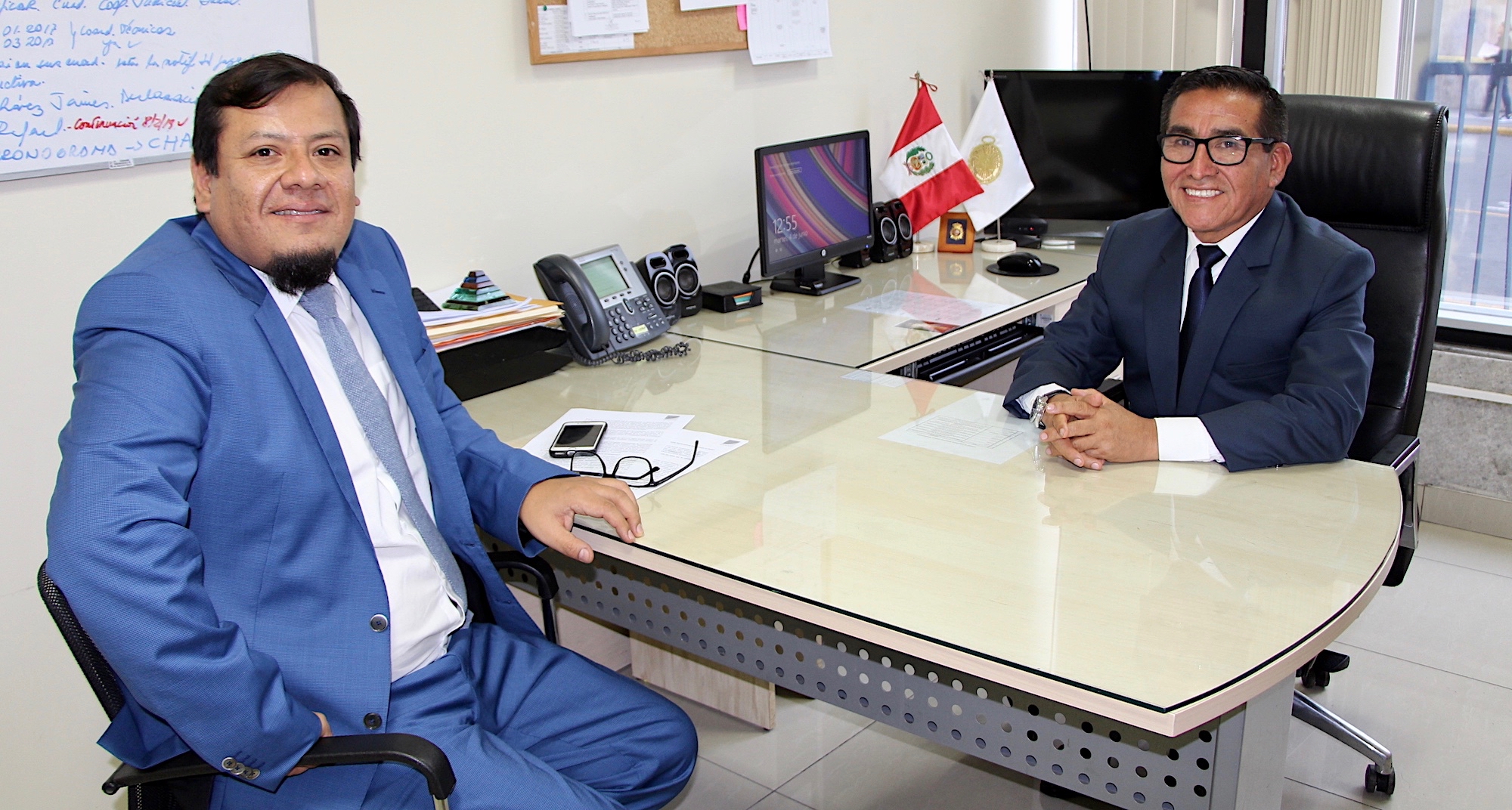Odebrecht in Peru: Interview with Prosecutor Elmer Chirre on "following the money" and getting it back

An exclusive interview with Elmer Chirre Castillo (photo: right), Provincial Prosecutor of the Third Anti-Corruption Supraprovincial Prosecutor's Office of Lima.
By Oscar Solorzano (photo: left), Senior Asset Recovery Specialist and Country Manager for the Basel Institute's Peru country office.
Background on Odebrecht bribery in Peru
Prosecutor Elmer Chirre received us in his office at the Anti-Corruption Specialised Prosecutor's Office to talk about the impressive results of his latest corruption and money laundering investigation.
On 11 June 2019, the Regional President of Ancash region in northern Peru, Cesar Alvarez, and his associates were sentenced to more than eight years in prison. As part of the sentencing, the bribe-payer – Brazilian multinational Odebrecht – had to paid fines and civil reparations amounting to USD 20 million, which have already been transferred to the Peruvian treasury.
This decision is particularly important since it is the first recovery of assets linked to the investigations against Odebrecht in Peru and the first of several investigations linked to the Brazilian multinational to obtain a judicial sentence. It paves the way for numerous cases currently under investigation in the same complex of facts.
Oscar Solorzano: Please can you briefly describe the different steps your investigation followed to obtain such a result?
Elmer Chirre: "In 2015, my Office was assigned the case known as "La Centralita", an investigation into an alleged criminal organisation for corruption and money laundering, among other crimes. Later, in April 2018, we were also assigned the "Chacas San Luis" case, relating to corruption cases in similar factual circumstances.
In both cases, the alleged leader of this criminal organisation was the former Regional President of the northern Peruvian region of Ancash (2007-2010 / 2011-2014), Cesar Alvarez Aguilar. Also in both cases, there was not only a factual link with respect to the crime of corruption but also a sequential and structural link with respect to the crime of money laundering. It has now been stated by a court of law that the proceeds of corruption paid in the context of important infrastructure projects in the Ancash region – namely the "Rehabilitation, Improvement and Construction of the Huaylas-Chacas-San Luis Highway" – were laundered with the help of intermediaries and offshore structures in different jurisdictions.
To disguise the illicit payments, the criminals used two methods:
- illicit payments within the country through fictitious contracts;
- illicit payments outside the country through offshore legal structures linked to Odebrecht's structured operations department.
It has been proven in the Peruvian justice system that the illicit commissions correspond to 2.5% of the value of the project, which was PEN 404,826,000 (over USD 121 million)."
When did the investigation begin?
"The investigations were initiated by different Provincial Anti-Corruption Prosecutors' Offices in Chimbote and Huaraz, in the Ancash region, from 2011 in "La Centralita" case and from 2014 in the "Chacas San Luis" case. These cases were initiated long before the Odebrecht cases started in Peru [December 2016, with the trilateral Swiss-US-Brazil settlement].
The cases took time because the investigations were highly complex in terms of the number of individuals under investigation, the number of crimes, the judicial processes, the locations in which the events took place, and lastly the corruption and money laundering schemes implicating a large number of contracts, banks and foreign jurisdictions.
Around 101 individuals were initially investigated, of which about 29 were civil servants and 72 were natural and legal persons. Four legal entities were investigated, one of which was Odebrecht."
Who were the officials involved?
"In both cases, the participation of former Regional President Cesar Alvarez Aguilar, along with high-ranking regional officials acting as managers and officials linked to infrastructure works and administration that formed Alvarez’s inner circle of trust, was clear.
The other individual who stood out was the Dirsse Paul Valverde Varas, who was a high-ranking official of the region and later stepped down from his post in order to facilitate his role within the criminal organisation.
The main objective of my investigation was to look for convincing evidence proving the crimes of the criminal organisation. In this sense, as a result of the investigative efforts made in "La Centralita" case, information was obtained that led to the suspicion of irregular payments to Dirsse Valverde by Odebrecht, as well as details of some meetings between Alvarez and Odebrecht executives in different parts of the country.
The evidence revealed that the meetings revolved around the most important infrastructure works in the region and the existence of an illicit agreement for the “Huaylas-Chacas-San Luis” highway project. These facts were gradually and consistently corroborated, particularly through information obtained via mutual legal assistance in criminal matters from Hong Kong with the technical assistance of Basel Institute on Governance experts. This information allowed us to move from simple suspicions to a more consistent working hypothesis, which, in turn, allowed the Peruvian Attorney General’s Office (AGO) to be in a better position to negotiate an agreement with Odebrecht.
It is interesting to note that in our case, the logic of the investigation – that is, the discovery of the facts subject to illicit negotiation – was not based on any testimony made by Odebrecht, but rather on the results of a thorough previous investigation. This had forced collaboration on the part of Odebrecht, which confessed the acts of corruption and money laundering schemes. Ultimately, this was what enabled the conviction of the Regional President and his associates, along with recovery of USD 20 million.
Without false modesty, this legal strategy is unique in the series of cases linked to Odebrecht in Peru and has had a tangible impact on the speed of progress of the case. My personal thanks go to the experts of the Basel Institute on Governance and to the authorities of the requested states who cooperated in the investigation."
Would you say, then, that for international cases of grand corruption, judicial cooperation in criminal matters has been key?
"Without a doubt – and the conviction we have just achieved is proof of this. I would like to point out that the world's financial centres have very specific requirements that must first be met by the countries making the request. That is, to have specific information, presented in a way that makes it possible to establish the soundness of the hypothesis or the request for information needed to identify the routes and stages involved in the money laundering.
In these times of globalisation, criminal organisations typically try to hide the evidence of their crimes with all means at their disposal. In that sense, from the perspective of the state that is the victim of these corruption acts, information from the receiving states is fundamental.
Without the help of experts such as those of the Basel Institute and the collaboration of these states, the fight against international grand corruption would only be a declaration of principle, with no real consequences."
Which particular jurisdictions have cooperated with your investigation?
"I would like to highlight Spain, Israel, Panama, the Bahamas and Hong Kong (in particular Hong Kong, which provided extraordinarily quick and useful responses through its International Central Authority). In this case, the criminal organisation used a different route to that used in other Odebrecht-related cases of corruption.
These jurisdictions are not the easiest in terms of international cooperation, and we had no major points of contact to help us. However, it was possible to establish solid lines of effective cooperation and obtain much-needed information for the two cases."
What has been your relationship with the Basel Institute on Governance and what role did it play in your investigation?
"My first link with the Basel Institute was through a high-level, intensive training course that was organised in the country in 2016 and led by international instructors specialised in money laundering and financial investigation. They provided insights into their extensive experience in their own countries as well as helping us to get to know and learn to use investigative tools that, in my case, have been applied and strengthened with day-to-day assistance to the investigation and during the trial.
The course covered international cooperation/mutual legal assistance, financial investigation and asset recovery, among other relevant topics."
What are your expectations of working together with the Basel Institute in the future and in the context of new investigations under your responsibility?
"As a prosecutor specialised in corruption, I must first acknowledge the very important contribution of the advanced training I received from the Basel Institute.
Secondly, I would like to thank the Basel Institute for its technical assistance to the Specialised Prosecutor's Office during the two cases "La Centralita" and "Chacas San Luis". As I said, this has enabled the first ever criminal conviction in Peru related to the Odebrecht case and the recovery of assets amounting to PEN 65 million (USD 20 million), an amount in civil reparations that is unprecedented in the history of our institution. Together with the Anti-Corruption Specialised State Attorney from the Ministry of Justice, Amado Enco, we were able to carry out the negotiations successfully with Odebrecht.
Thus, I reiterate and expresses my sincere thanks for the training received – not only for myself but also for the entire team of prosecutors of my Office – and especially for the "real-time" support we received during the investigation and prosecution. This type of case follow-up and application of the training have been extremely useful in achieving our objectives and I am convinced it will continue to be so in future investigations that my Office is charged with.
We renew our decision to continue our collaborative efforts with the cooperation of the Basel Institute."



